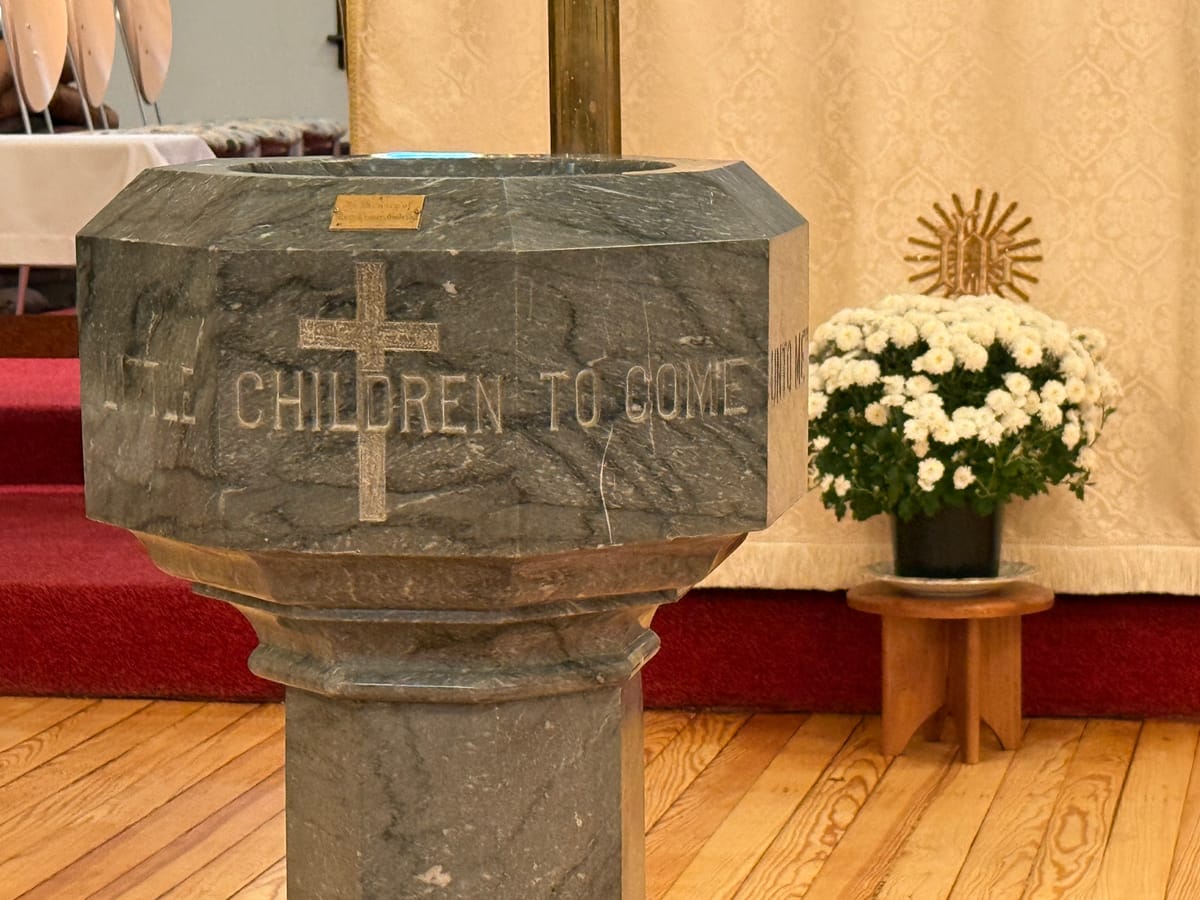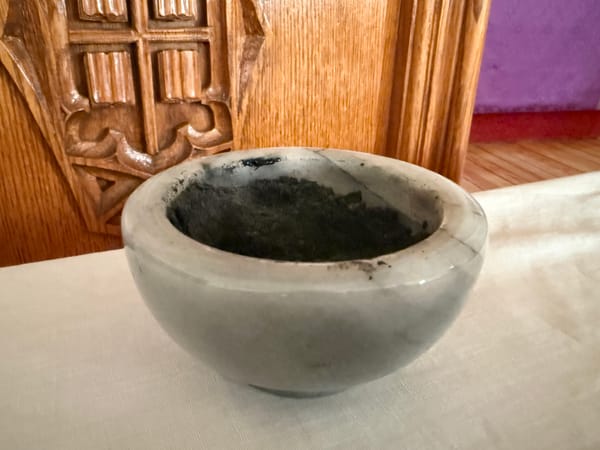Baptismal Community as an Alternative to Hate
It is our privilege here to be a different example... to lead each other toward life, toward the practice of love, toward connection, toward our God.

October 5, 2025 - The Seventeenth Sunday after Pentecost
My friends, I speak to you today in the name of one God, Father, Son, and Holy Spirit. Amen. Please be seated.
Good morning, Epiphany. Welcome to all our guests, human and otherwise. It’s good to see you all here this morning for what may end up being a noisy and joyous occasion, a baptism and a few pet blessings. Welcome. If you can’t hear the entirety of the sermon today, we have printed copies, and it’ll be on our podcast. As some of you know, this last Monday, I was supposed to get on a plane and fly to Sewanee, Tennessee, to spend a week at my alma mater, the University of the South and their School of Theology, for some alumni lectures with author Andrew Root and some homecoming festivities.
Well, that did not happen. Thanks, I think, to your prayers for safe travel, the pilots recognized before takeoff that the pressurization system on the plane didn’t work properly, and so my flights to Nashville were canceled. Other flights would not work with my schedule, so I came back home. That led to a less exciting week of online lectures and visits with friends around Western Michigan, but no trip to Sewanee. Maybe another time.
I share that with you this morning because something stuck out to me last Monday at Gerald R. Ford International Airport in Grand Rapids, something that has continued to get worse over the last decade I think, something you’re probably familiar with too. This is something I’ve harped on a bit as your priest, so this won’t surprise you, but I was still just shocked at how many people were buried in their devices. I saw one woman literally walk into a wall as she was looking at her phone. Everyone had their eyes glued to their little pocket computers, their black mirrors, while they waited for their flights, sure, but also while they were walking into walls. When our flight was canceled, the understaffed ticket counter handed out QR codes so everyone could scan them and use their phone to take care of their rebooking on their own. It felt like there was less conversation, less interaction than there used to be.
I love airports, Abbey and I both love people-watching at airports, wondering where people are going, what their lives look like outside this weird third place where we all are forced, still, to interact with each other to get where we are going. Next time you’re in an airport, or any place where people are forced to wait together in public, maybe look around and see how many people are transfixed by their iPhones, Androids. See if anyone can go more than a minute without it. It’s... something.
This last year, I’ve also had a fun book on my desk entitled “Our Epidemic of Loneliness and Isolation.” It’s from 2023, published by the U.S. Surgeon General under the Biden administration, a public advisory “on the Healing Effects of Social Connection and Community.” The context for that report, of course, is bleak. As a society, we’ve never felt more isolated, more alone. There are many reasons for that, but technology, for its part – technology which has promised us more connection than ever – has instead led to increased isolation, loneliness that is making us diagnosably ill, both mentally and physically.
Facebook, in particular, promised to connect friends all across the world. That didn’t pan out in an entirely positive way, as I’ve mentioned, so a few years ago, they introduced their Metaverse, virtual reality where your avatars can engage with “real” friends online. No one bought into that really, so this last week, Mr. Zuckerburg promised a future where AI friends can replace all the friends you’ve lost over the years. We need friendship, right? ...That feels like big tobacco suggesting that cigarettes can help cure cancer. Emmanuel Macron, the president of France, suggested on Friday that maybe we shouldn’t be trusting democracy to the goodwill of American entrepreneurs, maybe we shouldn’t allow those focused on making profit with addictive ragebait and conspiracy to have so much of a say over how we spend our time, how our kids spend their time. I’d argue we shouldn’t trust them with friendship either, but that battle already seems lost.
So why am I starting the sermon today, on this joyous Sunday, ranting about iPhones and loneliness, social media and democracy? How does that connect with the lectionary, with the gospel of Luke, with baptism or with our pets, with the good news of Jesus Christ? I could not escape these connections this week, so thank you for sticking with me.
Our gospel reading today comes from Luke 17, following last week’s text where Jesus talked to the Pharisees about wealth and their priorities, and the text the week before where Jesus talked to the disciples about theirs. Maybe understanding that the commands he had given in Luke 16 were difficult to live by – worshiping God rather than money, prioritizing relationships over profit – Jesus starts here by saying, “Occasions for sin are bound to come.” Basically, “I know you’re going to mess up on this call considering the entirety of the world around you. I know you’re going to struggle to live in love, to claim the life that really is life.”
But Jesus does not place blame on us for struggling, not on his disciples, not on those who believe and try to follow him. He knows this is a difficult path to follow. Instead, using a famous and brutal image, Jesus says the blame falls upon those around us who lead anyone astray: it would be better for them to be drowned in the sea, with a millstone hung around their neck. In Matthew, the phrase reads, “If any of you cause one of these little ones who believe in me to sin...” ...These little ones.
Friends, this morning, we get to baptize little Cecilia Gonzalez, one of the granddaughters of Marla and Marty Zwolan who we prayed for throughout Stephanie’s pregnancy this last year. This little one is a blessing, as all babies are, bringing joy to her family’s life and to ours.
And baptism is a big deal in the Episcopal Church; we have what is called a baptismal ecclesiology. All are welcome to be baptized here, to join in on the goodness of being part of a welcoming, loving community of faith. Baptism has a long history as the rite of initiation into membership in the body of Christ. Centuries and centuries of Christians have taken this step to declare their own intention to live as followers of Christ, or, as today, to declare their family’s intention to raise their children in this way of love. Some over the history of our tradition have been baptized in cathedrals after years and years of classes; others come to it in a river or lake or as their very first step of faith.
But what it means for us this morning, what it means for the Gonzalez family and the Zwolans, what it means in the Episcopal tradition begins in our liturgy, starting on page 8. The first question I’ll pose to the family feels the most important to me this morning: “Will you be responsible for seeing that the child you present is brought up in the Christian faith and life?” They’re all good questions, honestly, but that one may have some baggage for some today, especially for those forced to go to Catholic school back in the 1900s. All we ask of this family this morning is that they introduce this baptized child to Jesus, to his way of love, to surround their little one with those who will love her and teach her to love, to protect her from those who may cause her to sin or lead her astray.
And then the question we pose to you all, representing the entirety of Christ’s church this morning, that comes at the end of the presentation at the top of page 9: “Will you who witness these vows do all in your power to support Cecilia in her life in Christ?” When we are lucky enough to have an opportunity... will we be here to love and support her?
Philosopher and theologian James K.A. Smith wrote a book, maybe my favorite book, entitled “You Are What You Love.” In it, he writes this: “It is crucial for us to recognize that our ultimate loves, longings, desires, and cravings are learned. Love is a habit; our hearts are calibrated through imitation of others and being immersed in practices that, over time, bring our hearts to a certain end.” I harped on our phones, on social media at the beginning this morning. Friends, the way we spend our time, the media we consume, it matters, deeply. It forms us. I am not here to hang a millstone around Mr. Zuckerburg’s neck for building an addictive platform that inevitably fuels our hate for the other. I’m not here to hang one on Steve Jobs or Tim Cook at Apple either... but that is because I am not their judge. That’s not my job; judgment is not a job assigned to any of us, thankfully. Our only job is to love.
And love cannot be taught with words or in sermons, it must be felt, it must be lived, it must be practiced, it must be witnessed and imitated. We may love our pets; they are a beautiful, God-given opportunity for us to practice love, to show love, to be loved. And as for us humans, Cecilia and all of us here this morning and all of us everywhere this morning, we are all loved. We are all loved by God, and we are loved and supported and built up by being surrounded by the body of Christ. We commit as Christians to love God and love each other, that’s what it means to be a Christ follower, to be a member of a church, to be surrounded by others who, like us, make a real commitment to love.
Too often we all get caught up in other things. As Jesus says here, friends, “Be on your guard.” Please recognize, this morning, that people and corporations make a lot of money off of our rage and our constant engagement, off of our addiction to our political newsletters and our social media and our devices and not to connecting with and serving and being in relationship with the people around us. Those profiteers are not surrounding us with love, they are not teaching us to love, they are not encouraging us to love, because they have simply found that love is not as profitable as hate.
Thankfully, it is our privilege here as the church of Jesus Christ to be a different example, to help lead Cecilia over the course of her life, to lead each other here at Epiphany, to lead each other toward life, toward the practice and habits of love, toward connection, toward the God of creation who wants the very best things for all of us, if only we look up from ourselves, look up from our devices, and see the people around us, who are like us, so desperately in need of love.
This morning and always, may we all be surrounded by those who will love us without exception and whom we ourselves can love and not hate or ignore, by those who, in their very being, will point us toward Jesus.
Amen.




